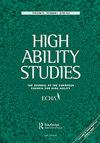什么是高等教育和职业成就?教育,智力,努力工作,网络和其他因素
IF 1.3
4区 教育学
Q2 EDUCATION, SPECIAL
引用次数: 16
摘要
影响高学历和职业成就的因素有很多,包括努力、动力和运气。但人才有多重要?具体来说,全球创新者和领导者年轻时在智力或天赋方面有多大可能?本文回顾了多个美国样本(总N=11745)的回顾性数据,包括首席执行官、联邦法官、政治家、千万富翁和亿万富翁、商业领袖、精英记者和“全球最有影响力的男性和女性”,考察了这些群体在多大程度上处于青年一般智力人才的前1%,同时考察他们的教育背景。在我们的能力指标中,这些领导者中约有50%处于前1%,因此比例过高约为50。精英教育,尤其是哈佛大学的影响是显著的,这表明除了人才,精英教育和网络也很重要。这些数据表明,不同的职业可能来自不同水平的智力天赋。基于这些数据和先前文献的综合,提供了关于天才教育的具体政策建议。我们建议政策重点关注有才华的低收入和弱势学生,他们在美国社会的这些领导者中代表性极低。本文章由计算机程序翻译,如有差异,请以英文原文为准。
What goes into high educational and occupational achievement? Education, brains, hard work, networks, and other factors
Abstract There are many factors that go into high educational and occupational achievement, including hard work, motivation, and luck. But how important is talent? Specifically, how likely were global innovators and leaders intellectually talented or gifted when younger? This paper reviews retrospective data on multiple US samples (Total N = 11,745), including Chief Executive Officers, federal judges, politicians, multi-millionaires and billionaires, business leaders, elite journalists, and the “most globally powerful men and women”, examining to what extent these groups were in the top 1% in general intellectual talent in youth, also examining their educational backgrounds. About 50% of these leaders were in the top 1% of our indicator of ability, so overrepresented by a factor of about 50. Elite education, and especially the impact of Harvard, was notable, suggesting that in addition to talent, elite education and networks were important. These data suggest that various occupations may draw from different levels of intellectual giftedness. Based on this data and a synthesis of prior literature, concrete policy recommendations for gifted education are provided. We recommend a policy focus on talented low income and disadvantaged students, who are greatly underrepresented among these leaders of US society.
求助全文
通过发布文献求助,成功后即可免费获取论文全文。
去求助
来源期刊

High Ability Studies
Multiple-
CiteScore
4.80
自引率
11.10%
发文量
7
期刊介绍:
High Ability Studies provides a forum for scholars in a variety of disciplines associated with the development of human abilities to their highest level. It is a medium for the promotion of high ability, whether through the communication of scientific research, theory, or the exchange of practical experience and ideas. The contents of this journal are unique in reflecting concerns and recent developments in this area from childhood and across the whole life span in a variety of contexts. Far from being restricted to the traditional focus on high-level cognitive development, it also presents investigations into all other areas of human endeavour, including sport, technology, the arts, business, management and social relations.
 求助内容:
求助内容: 应助结果提醒方式:
应助结果提醒方式:


